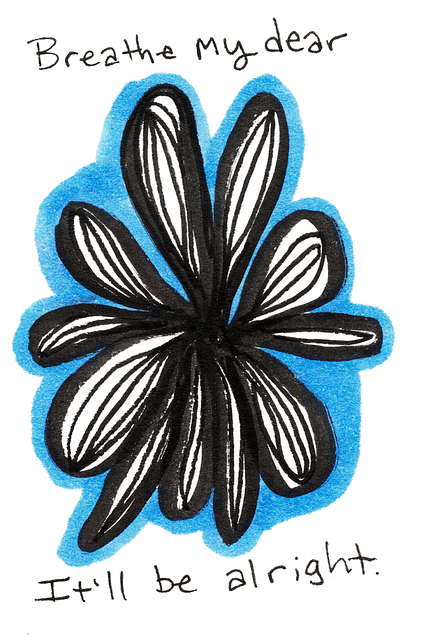Facilitating group therapy for elderly individuals with mental health challenges, especially sexual addiction, requires a tailored approach. This involves adapting techniques for physical and cognitive impairments, fostering peer connections, and providing specialized care. Creating a safe, supportive environment with clear communication and active listening is crucial. Facilitators should employ evidence-based therapeutic techniques like CBT and MI, maintaining cultural sensitivity. Community-oriented approaches, including ongoing support groups and personalized care plans, enhance mental wellness by promoting emotional expression and self-care practices. Public awareness campaigns aim to break stigma and make therapy more accessible for elders struggling with sexual addiction.
Mental wellness group facilitation plays a vital role in enhancing the lives of elderly individuals, addressing their unique challenges. This article explores effective techniques for facilitators working with this demographic. We delve into understanding the specific needs of the elderly in group settings, fostering safe spaces through robust communication strategies. Additionally, we examine therapeutic approaches to tackle sexual addiction among elders, offering a comprehensive guide to care. The focus is on long-term wellness through community-building activities and follow-up care.
- Understanding the Unique Needs of Elderly Individuals in Group Settings
- Effective Communication Strategies for Facilitating Safe and Supportive Spaces
- Incorporating Therapeutic Techniques to Address Sexual Addiction in an Elderly Population
- Fostering Community and Accountability: Group Activities and Follow-up Care for Long-Term Wellness
Understanding the Unique Needs of Elderly Individuals in Group Settings

In group settings, facilitating therapy for elderly individuals requires a nuanced approach that acknowledges their unique needs and challenges. As people age, they often face distinct mental health concerns compared to younger demographics. For instance, cognitive changes, physical limitations, and social isolation can significantly impact an elder’s psychological well-being. Group facilitation should aim to create a safe and supportive environment where elders feel comfortable sharing their experiences without fear of judgment. This involves adapting therapeutic techniques to accommodate any mobility issues, ensuring clear communication strategies for those with age-related cognitive impairments, and fostering peer connections that can combat feelings of loneliness.
Addressing specific concerns like sexual addiction in the elderly requires specialized care within these group settings. It’s important to approach this sensitive topic with empathy and understanding, recognizing that sexual health is an integral part of overall well-being. Facilitators can help by encouraging open dialogue, promoting self-care routine development for better mental health, and integrating mental health policy analysis and advocacy to ensure elders receive appropriate support tailored to their needs. Ultimately, facilitating group therapy for seniors involves creating a holistic space that caters to both the mind and body, taking into account the diverse range of issues that can affect this demographic.
Effective Communication Strategies for Facilitating Safe and Supportive Spaces

Creating a safe and supportive space is paramount when facilitating mental wellness groups, especially when dealing with sensitive topics such as sexual addiction in elders. Effective communication strategies are key to achieving this. Facilitators should employ active listening techniques, allowing participants to express their thoughts and feelings openly without judgment. This fosters an environment of trust and encourages vulnerability, essential for healing.
Additionally, clear and concise language helps prevent misunderstandings. For instance, when discussing therapy for elders with sexual addiction, using straightforward terms avoids stigmatization and promotes a better understanding of the issue. Incorporating mental health education programs design elements can further enhance communication, ensuring facilitators are equipped with the latest research and strategies. Risk management planning for mental health professionals is also crucial to handle any potential challenges that may arise during group sessions, fostering a secure atmosphere where self-care routine development for better mental health can flourish.
Incorporating Therapeutic Techniques to Address Sexual Addiction in an Elderly Population

In addressing sexual addiction among the elderly, facilitators must incorporate therapeutic techniques tailored to this demographic, considering the unique challenges and needs of an aging population. Many older adults struggle with cognitive changes, physical limitations, and social isolation, which can contribute to or exacerbate sexual addiction. Thus, a holistic approach is essential, focusing not only on treating the addiction but also addressing underlying issues such as loneliness, depression, or cognitive decline. Incorporating evidence-based practices like cognitive-behavioral therapy (CBT) and motivational interviewing (MI) has shown promise in helping elders manage their addictions.
Cultural sensitivity in mental healthcare practice is paramount when facilitating these groups. Older adults come from diverse backgrounds, each with its own values and beliefs about sexuality and mental health. Facilitators should employ empathy building strategies to create a safe and supportive environment where participants feel respected and understood. By integrating mind over matter principles, focusing on reframing negative thought patterns and behaviors, facilitators empower elders to take control of their recovery. This approach not only helps address sexual addiction but also enhances overall mental wellness in this vulnerable population.
Fostering Community and Accountability: Group Activities and Follow-up Care for Long-Term Wellness

Fostering a sense of community within therapeutic settings is vital for long-term mental wellness, especially for elders struggling with complex issues like sexual addiction. Group facilitation techniques play a crucial role in creating a safe and supportive environment where participants can share their experiences, build connections, and hold each other accountable. Through group activities, members learn to express emotions, develop coping strategies, and gain new perspectives, enhancing their overall mood management skills.
Regular follow-up care is another essential aspect of post-therapy support. This can include ongoing meetings, peer support groups, or personalized care plans tailored to individual needs. Such initiatives ensure that elders receive the necessary tools and resources to maintain their progress, navigate challenges, and stay engaged in self-care practices like mindfulness meditation. Public awareness campaigns development around mental health should also focus on breaking stigma and promoting accessible therapy for elders, addressing specific concerns such as sexual addiction.
Group facilitation techniques play a pivotal role in enhancing mental wellness among elderly individuals. By understanding their unique needs, employing effective communication strategies, integrating therapeutic approaches like addressing sexual addiction, and fostering community through engaging activities, facilitators can create safe, supportive, and long-lasting care environments. These holistic methods not only promote healing but also ensure that seniors receive the tailored support they deserve, ultimately improving their overall well-being. Moreover, incorporating these techniques can revolutionize how we approach therapy for elders sexual addiction, contributing to a more inclusive and effective treatment landscape.














